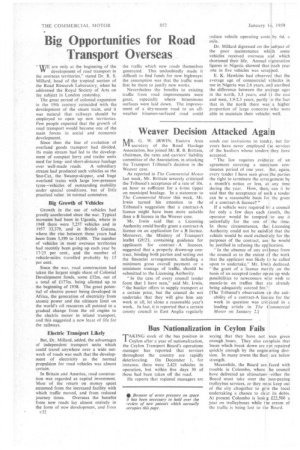Big Opportunities for Road Transport Overseas
Page 68

If you've noticed an error in this article please click here to report it so we can fix it.
WE are only at the beginning of the development of road transport in the overseas territories," stated Dr. R. S. Millard, head of the tropical section of the Road Research Laboratory, when he addressed the Royal Society of Arts on the subject in London yesterday.
The great period of colonial expansion in the 19th century coincided with the development of the steam train, and it was natural that railways should be employed to open up new, territories. Few people expected that the growth of road transport would become one of the main forces in social and economic development.
Since then the line of evolution of overland goods transport had divided. Its main stream had led to the development of compact lorry and trailer units used for longand short-distance haulage over well-made roads. A subsidiary stream had produced such vehicles as the Sno-Cat, the Swamp-skipper, and huge overland trains with large low-pressure tyres—vehicles of outstanding mobility under special conditions, but of little practical value in normal commerce.
Big Growth of Vehicles Growth in the use of vehicles had greatly accelerated since the war_ Typical increases had been in Uganda, where in 1948 there were 7,257 vehicles and in 1957 33,379, and in British Guiana, where the rise between these years had been from 3,190 to 14,006_ The number of vehicles in most overseas territories had recently been going up each year by 17-25 per cent., and the number of vehicle-miles travelled probably by 15 per cent
Since the war, road construction had taken the largest single share of Colonial Development funds, some £32m. out of a total of £177m. being allotted up to the beginning of 1958. The great potential of electric power being developed in Africa, the generation of electricity from atomic power and the ultimate limit on the world's oil resources all pointed to a gradual change from the oil engine to the electric motor in inland transport, and this suggested a new lease of life for the railways.
Electric Traoiport Likely
But, Dr. Millard, added, the advantages of independent transport units which could travel anywhere over a wide network of roads was such that the development of electricity as the normal propulsion for road vehicles was almost certain.
In Britain and America, road construction was regarded as capital investment. Most of the return on money spent stemmed from the increased facility with which traffic moved, and from reduced journey times. Overseas the benefits from new roads lay almost entirely in the form of new development, and from (.732 the traffic which new roads themselves generated. This undoubtedly made it difficult to find funds for new highways: the assumption was that the traffic must first be there to justify new works.
Nevertheless the benefits to existing traffic from road improvements were great, especially where bituminous surfaces were laid down. The improvement of a dry-season road to an allweather bitumen-surfaced road could reduce vehicle operating costs by 6d. a mile.
Dr. Millard digressed on the subject of the poor maintenance whi.:11 some vehicles received overseas aud which shortened their life. Annual rogistration figures in Nigeria showed that each year one in five vehicles was scrar ped.
E. K. Hawkins had observel I that the average age of commercial v:hicles in use in Nigeria was 2.6 years, an I ascribed the difference between the avc rage ages in the north, 3.3 years, and i the east and west, 1.9-2.3 years, partly o the fact that in the north there was a higher proportion of large concerns who were able to maintain their vehicle: well.








































































































